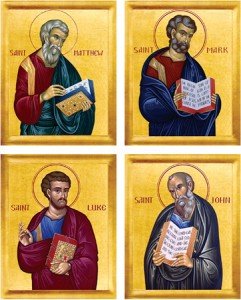 The conviction of the divine origin of the Jewish sacred books is, in the context of Christianity, repeatedly implied or expressed in the pages of the New Testament (NT). Jesus is presented as employing the customary Jewish term for the totality of the sacred books, namely Scripture, the documents par excellence. He is shown as regarding this Sacred Scripture as irrefragable, impossible to annul. He is also depicted as introducing a statement that is authoritative and not open to question by the phrase “It is written” – a typical Jewish reference to the Old Testament (OT) books. Of course we know that He taught as the Rabbis taught and really quoted the OT extensively. In annotated versions of the NT, where the references to the OT are highlighted, we see that Jesus, and then His apostles, extensively quoted the OT.
The conviction of the divine origin of the Jewish sacred books is, in the context of Christianity, repeatedly implied or expressed in the pages of the New Testament (NT). Jesus is presented as employing the customary Jewish term for the totality of the sacred books, namely Scripture, the documents par excellence. He is shown as regarding this Sacred Scripture as irrefragable, impossible to annul. He is also depicted as introducing a statement that is authoritative and not open to question by the phrase “It is written” – a typical Jewish reference to the Old Testament (OT) books. Of course we know that He taught as the Rabbis taught and really quoted the OT extensively. In annotated versions of the NT, where the references to the OT are highlighted, we see that Jesus, and then His apostles, extensively quoted the OT.
The source of this sovereign authority of the sacred books is also identified by Jesus – the words of Scripture are decisive because they are the words of God. This is brought out in such passages in which Jesus replies to a leading question about divorce by saying, “He who made them … said: Hence a man shall leave his father and mother and cleave to his wife….” Jesus here ostensibly quotes words of God from Genesis 2:24 – words that in their own context, however, are given as a statement of the human writer and not as a statement of God.
An identical attitude toward the Jewish sacred books is no less apparent elsewhere in the NT. They are regularly referred to as Scripture. This word appears in the NT 51 times, and each time it refers to a part, or parts of the OT. Moreover, NT writers express the conviction that in the words of this Scripture the Holy Spirit spoke by the mouth of human beings. So close was the identification of God with the OT in the minds of the NT writers that the two terms are used interchangeably. Thus Paul writes to the Romans: “Scripture says to Pharaoh” words that according to Exodus were words of Yahweh to be spoken to Pharaoh through Moses. Words from the OT are cited as the words of God. This is remarkably confirmed in Paul’s letters to the Hebrews and Romans where words from the OT are attributed to God regardless of whether in the original text they were put on the lips of God. The NT writers were able to refer to passages from the OT as the “oracles of God.” Thus, inspiration of the NT has been influenced by this.
